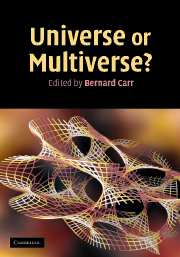Book contents
- Frontmatter
- Contents
- List of contributors
- Preface
- Acknowledgements
- Editorial note
- Part I Overviews
- Part II Cosmology and astrophysics
- 4 Cosmology and the multiverse
- 5 The anthropic principle revisited
- 6 Cosmology from the top down
- 7 The multiverse hierarchy
- 8 The inflationary multiverse
- 9 A model of anthropic reasoning: the dark to ordinary matter ratio
- 10 Anthropic predictions: the case of the cosmological constant
- 11 The definition and classification of universes
- 12 M/string theory and anthropic reasoning
- 13 The anthropic principle, dark energy and the LHC
- Part III Particle physics and quantum theory
- Part IV More general philosophical issues
- Index
- References
4 - Cosmology and the multiverse
Published online by Cambridge University Press: 05 July 2014
- Frontmatter
- Contents
- List of contributors
- Preface
- Acknowledgements
- Editorial note
- Part I Overviews
- Part II Cosmology and astrophysics
- 4 Cosmology and the multiverse
- 5 The anthropic principle revisited
- 6 Cosmology from the top down
- 7 The multiverse hierarchy
- 8 The inflationary multiverse
- 9 A model of anthropic reasoning: the dark to ordinary matter ratio
- 10 Anthropic predictions: the case of the cosmological constant
- 11 The definition and classification of universes
- 12 M/string theory and anthropic reasoning
- 13 The anthropic principle, dark energy and the LHC
- Part III Particle physics and quantum theory
- Part IV More general philosophical issues
- Index
- References
Summary
Do the ‘special’ values of the constants of physics and cosmology need an explanation?
In his book Galaxies, Nuclei and Quasars [1], Fred Hoyle wrote that ‘one must at least have a modicum of curiosity about the strange dimensionless numbers that appear in physics’. Hoyle was among the first to conjecture that the so-called ‘constants of nature’ might not be truly universal. He outlined two possible attitudes to them. One is that ‘the dimensionless numbers are all entirely necessary to the logical consistency of physics’; the second possibility is that the numbers are not in the broadest sense universal, but that ‘in other places their values would be different’. Hoyle favoured this latter option because then
the curious placing of the levels in C12 and O16 need no longer have the appearance of astonishing accidents. It could simply be that, since creatures like ourselves depend on a balance between carbon and oxygen, we can exist only in the portions of the universe where these levels happen to be correctly placed.
Whatever one thinks of its motivation, Hoyle's conjecture is now even more attractive. The ‘portions of the universe’ between which the variation occurs must now, we realise, be interpreted as themselves vastly larger than the spacetime domain our telescopes can actually observe — perhaps even entire ‘universes’ within a multiverse.
If we ever established contact with intelligent aliens, how could we bridge the ‘culture gap’? One common culture (in addition to mathematics) would be physics and astronomy. We and the aliens would all be made of atoms, and we would all trace our origins back to the big bang 13.7 billion years ago. We would all share the potentialities of a (perhaps infinite) future. But our existence (and that of the aliens, if there are any) depends on our universe being rather special.
- Type
- Chapter
- Information
- Universe or Multiverse? , pp. 57 - 76Publisher: Cambridge University PressPrint publication year: 2007
References
- 4
- Cited by



